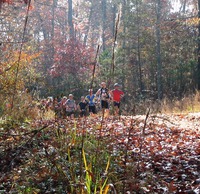Survival Of The Fittest and how it relates to sport
Posted by Matt Russ on 2nd Aug 2018
The survival statistics of people lost in extreme environments are very interesting, and not at all what you would expect. In fact, one of the demographics that has the best survival rate is actually children under six years of age. Accomplished adventurers, ex-military, or even wilderness guides do not fare nearly as well as we would think. Their experience, or rather over-confidence, ego, and intellect may work against them to the point that it costs their lives.
When we are lost, often the first thing that works to our detriment is a failure to recognize that we are in fact lost. We try to rectify the position we are now in with what which we previously knew to be true—but the two no longer match. We think we might know where we are when we don't. Our emotions get in the way of reason and panic sets in, often leading us deeper and deeper into the wilderness. The extreme adventurers commonly take their skills for granted, and fail to fully appreciate the danger they are facing. Their assertiveness and pride exposes them more frequently to dangerous situations with a false sense of security in their own abilities to get them out of trouble. Experience alone does not protect one from the sudden forces of gravity, exposure, or dehydration; but having the reason to avoid these situations altogether does. A strong will, an ability to control emotion, a humble appreciation and awareness for risk, adaptability, and reasoning skills increase one's survival rate dramatically.
In comparison to an adult, a six year old will rest when they get tired instead of pushing their limits, seeks warmth, drinks when they are thirsty and generally will not travel far, which makes rescue considerably more likely. They do not have a well-developed ego to contend with that often leads us adults steadfastly in the wrong direction. They recognize that lost is lost and remain focused on their immediate needs, which are the most important in a survival situation. The six year old immediately seeks to reduce their stress levels. Cold, dehydration, mental strain, and fatigue all wear down a person's batteries in a very short period of time—to a point that they may never be recharged again.
There is no physiological definition of fatigue. Scientists have been unable to find it in the muscles or nerves and they still debate the causes and effects. There is one thing that is certain, however; with fatigue comes a loss of spirit. Everyone has a breaking point at which the physical pain and mental exhaustion becomes overwhelming and they simply give up. Once a person reaches this point it is very difficult to change their mindset and they often remain resigned to their fate, even when faced with rescue.
How can these lessons be applied to your own endurance training and racing? There are some parallels to consider right off the bat. Just like surviving in the wilderness, training and racing is all about energy and stress management. Athletes generally do a poor job of this, especially if they are using too much emotion and not enough reason. Just as each survival situation is unique, each athlete faces the unique demands of their individual lifestyle such as work stress, sleep quality, nutritional constraints, and capacity for recovery. Despite each athlete's unique situation, often times athletes will look for the perfect template or approach--- the “right” plan to get them where they want to go. Training in fact needs to be a creative, fluid, and adaptable process based on a variety of situational factors. This is not to imply that you should not have a training plan (or map)-- perhaps even a very detailed one. What is important to recognize is that even the best designed, fully customized training plan will need to be modified and adapted to the daily circumstances of your life. If you feel the impulse to check a box or put more training in the bank than the next guy, you are letting emotion dictate your actions instead of doing what is most effective for your body.
Emotion can be an incredible driving force but it can just as easily get us lost in the woods. For example, it is very easy to compare yourself to others, and to compare your training to what others are doing. This creates anxiety and a tendency to believe there is never “enough” training in your bank, right up to the point of being over trained or injured. But by then it is too late—you are lost in the woods. Athletes ignore the not-so-subtle signs that are right in front of them: chronic fatigue, irritability, loss of interest, changes in appetite, nagging injury, and increased muscle soreness. They fail to adapt, and focus on their immediate needs of reducing stress, increasing rest, replenishing energy stores, and stopping their progress on the path deeper into the wilderness. This fatigue can become so acute that it breaks their spirits. Highly motivated, type A over-achievers are the most susceptible to over training. They believe that the harder they push, the harder they work, and the more the effort they put forth, the faster they will become. In fact endurance training may be the one area of their lives in which less is more. They trudge manically on until they are hopelessly lost.
When survivors are questioned as to what kept them going through the pain and sometimes agonizing situations they faced, often when others gave up, the answer usually is not to save themselves. Instead, they were working to see their wife, daughter, or friends again, and fighting to live so that their family would not have to face a catastrophic loss. We call this extrinsic motivation in the coaching world, and it is the best kind. This is what gives an athlete their spirit and true purpose. It keeps them going when others give up. Just wanting to survive is often not enough. You have to have a good reason to want to survive when the situation is most dire. A sense of humor is actually a critical survival tool. Humor lowers anxiety and restores mental balance, and it is a great defense against panic. I have noted that a sense of humor is a key ingredient to a successful race season and a valued tool in the athletes mental arsenal.
The athlete that gets the most out of their training surfs upon the waves of stress and recovery while remaining balanced and in tune with themselves. When they are tired they rest more, absorb nutrients that will sustain them optimally, and do not let their emotion overrule their reason. They may laugh in the face of adversity but also respect it. They recognize that their energy is a scarce resource and train just the right amount, at the right time, then focus on replenishment. They can see themselves objectively and with reason, and balance risk/reward of their training against what will yield the most return. They have a spirit and purpose that keeps them buoyed and focused through the toughest training. Their strength comes not just from their toughness, it is in their flexibility, adaptability, and reason. One of the most common refrains I hear from athletes is “I am training hard but why is my performance diminishing instead of improving….” My answer- “You are tired-- now rest. Can't you see the forest for the trees?”
Matt Russ is a professional coach with over two decades of experience working with athletes up to the professional level. His athletes have achieved numerous regional, national, and international titles under his direction. Matt has achieved the highest level of licensing by both USA Triathlon and USA Cycling, and is a licensed USA Track and Field Coach. His accomplishments include being named "Team USA" Coach by USA Triathlon. Matt is Head Coach and owner of The Sport Factory, a USA Triathlon Certified Performance Center located in Roswell, Georgia. Visit www.sportfactory.com for more information or email him at coachmatt@sportfactory.com



